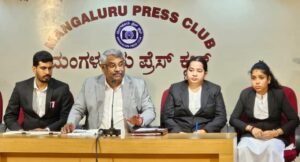Mangaluru, Aug 22: A group of lawyers has petitioned the Karnataka government to bring in a law on the lines of Kerala to regulate Ayurvedic centres, massage parlours, spas, salons and beauty parlours. They said repeated police raids on such establishments, without a specific legal framework, are arbitrary and humiliating for genuine service providers.

The delegation, led by former government prosecutor R Manoraj Rajeev, included advocates Shishir Bhandari, Roshani Sorab and Nadini Akhil. At a press conference at the Mangaluru Press Club on Thursday, they said illegal activities by a few operators were tarnishing the image of Ayurveda and the wellness industry, while thousands of honest workers — especially women — were facing harassment and loss of livelihood.
Rajeev pointed out that Kerala enacted a law in 2007 to license and regulate Ayurvedic and spa centres, ensuring accountability and enabling action against misuse. “In Karnataka, there is no such law. When there is no legal definition of immorality, how can raids branding spas as immoral be justified? Such action is itself unethical,” he said.
The lawyers added that the absence of legislation has created confusion, with some centres coming under the Karnataka Private Medical Establishments (KPME) Act and others under the Shops and Establishments Act. “Even officials are unsure about licensing norms. This vacuum has become a tool for harassment,” they alleged.
Rajeev also questioned gender bias, asking why the standards applied to spa therapists are not applied to nurses and obstetricians in hospitals. He said the wellness sector is a traditional industry in India, employing lakhs, and warned that lack of regulation could push many into unemployment due to false accusations and police action.
Key Highlights:
- Police raids on spas and massage centres without clear rules termed “unethical” by legal experts.
- Kerala’s 2007 licensing law cited as a successful model to regulate and curb misuse in the wellness sector.
- Confusion persists in Karnataka with centres split between the KPME Act and Shops & Establishments Act.
- Advocates warn that lakhs depending on Ayurvedic centres, spas and salons risk harassment, job loss and stigma if industry remains unregulated.
- Gender bias in enforcement also questioned by lawyers.
“This is not limited to one city but is a statewide issue. The Karnataka government must urgently enact a law to regulate the healthcare and wellness industry,” Rajeev said.






